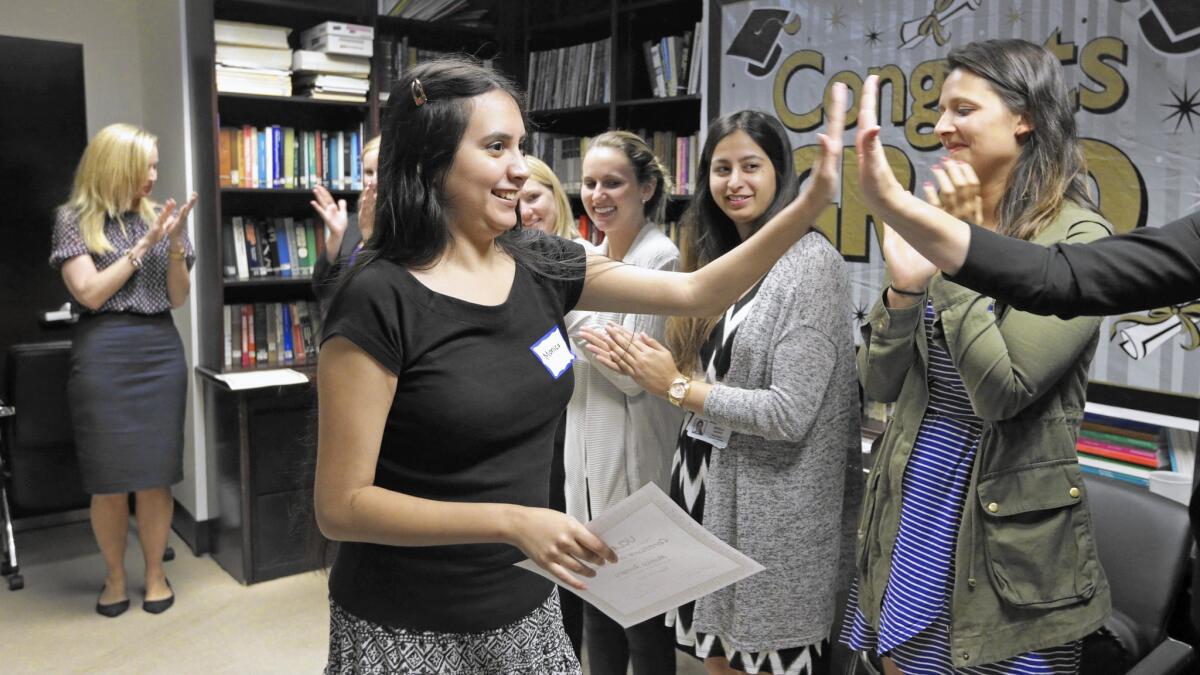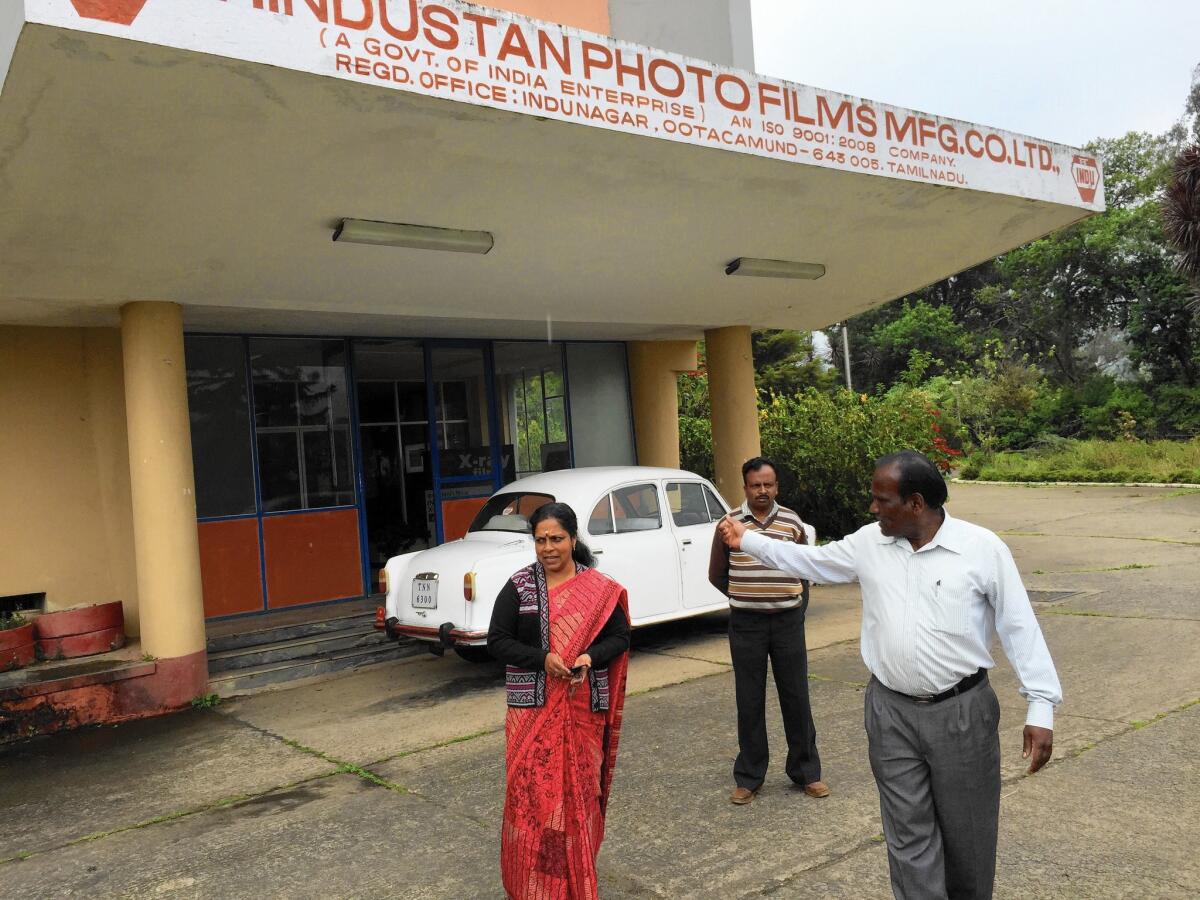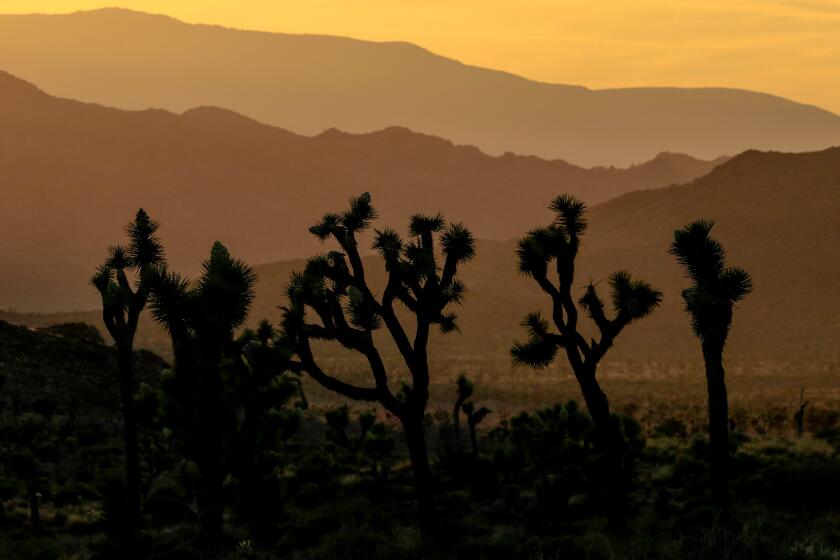Newsletter: Great Reads: Black-and-white film, paper boys and Tom Wolfe
Hey there. I'm Kari Howard, and I edit the Great Reads (a.k.a. Column Ones) for the Los Angeles Times.
Two of my biggest loves are narrative journalism and music, and I'm lucky that my days are filled with both: When reading the stories, I get inspired by songs I think fit the article's theme — a soundtrack.
Here are some of the past week's Great Reads (and lowercase great reads), plus their soundtracks.
The 7-foot-tall Chinese boxer and the lawyer from East L.A.
This is such a classic only-in-L.A. story. It has it all: A 7-foot-tall Chinese boxer. Who starts thinking about getting a green card while visiting Monterey Park. Who picks a Latino lawyer who just happened to have put up a Chinese-language sign — and who happens to have grown up in the boxing world of East L.A. "To me, this was bigger than the chance of a lifetime," the lawyer says. "How often do you find a Chinese guy that's 7 feet tall, cut like him and interested in boxing?" The lawyer got the boxer signed to a deal with Oscar De La Hoya's Golden Boy promoters, and the odd couple bonded. What began as a partnership became a friendship carried out in pantomime, mock punches on the arm and a mixture of broken Chinese and English. But would it have a happy ending — or end in tears?
Taishan Dong moves away from opponent Tommy Washington as referee Jack Reiss delivers a ten-count in a heavyweight bout at Fantasy Springs Resort in Indio. (Brian van der Brug / Los Angeles Times)
The soundtrack: "Odd Couple," by Weezer. I'm not a huge fan of the band, because irony in music isn't my thing, but you have to love this opening line: "I gotta a PC, you've got a Mac/I'm giving you flak for your airport/I read books and you watch TV/You wanna be free to relax more."
Dating is scary for anyone. Now imagine you're autistic.
People often think of autism as a childhood disease. But those children grow up to become young adults, and have to grapple with the minefield that is dating. Now a program at UCLA is trying to help, with a 16-week class to help them navigate the treacherous waters of social interaction. "A lot of people think that social skills in general are innate, that you're hard-wired in some way and that you either are born with social skills or you're not," says one of the people behind the program. She thinks the classes prove that idea wrong. My favorite bit was this quote from a "social coach" for one of the students: "It's been so helpful, even for people without disabilities. When the dating stuff came up, one of the moms was like, 'How are any of us married?'"

Monica Romero high-fives volunteers during her graduation ceremony from a 16-week course held at UCLA that helps young adults with autism build social skills. (Lawrence K. Ho / Los Angeles Times)
The soundtrack: "Sick of Myself," by Matthew Sweet. He seemed right for the awkwardness, somehow. I will never understand why Sweet wasn't a big hit. He has a gift for pure pop, with that touch of pining-for-you that I'm a total sucker for.
History isn't about statistics. It's about the people who are those statistics.
Can you imagine watching your father starve to death, even as you were starving yourself? More than half a century later, the Chinese government still doesn't want stories told about the disastrous Great Leap Forward that left millions dead. But a Chinese filmmaker is determined to get the survivors' stories before age takes them. In a brilliant move, he hands simple digital camcorders to amateurs. The project's interviews are raw and personal, captured on front porches and in living rooms and kitchens, full of lengthy digressions and background noise. "The Memory Project has greatly influenced me — it's even changed me," the filmmaker says. "Now when I talk about the famine period, I no longer talk about figures, like how many people died. I've been really touched by the lives of these individuals, how they'd survive on very little food, how they'd try their best to stave off death."
Zhang Mengqi, 28, second from right, with villagers in Diaoyutai, Hubei province, near a memorial that she helped build to commemorate local victims of the Great Famine. (Wu Wenguang)
The soundtrack: "Waiting for the Great Leap Forward," by Billy Bragg. Granted, this song isn't about Mao's Great Leap Forward; it's a defiantly political song. ("If you've got a blacklist I want to be on it" and "Start your own revolution and cut out the middleman.") But it's such a good song.
The slow (slow) death of a black-and-white film company
So much of this story about a state-owned maker of black-and-white film in India resonates with me, from the retro details to the sense of an era coming to a close. The first paragraph, for instance: In a musty reception room high in the southern Indian hills, a photo booth the size of a walk-in closet promises black-and-white pictures in four minutes. Groovy track lights illuminate a display table piled with X-ray film and movie-reel canisters. The company doesn't make the film anymore. Production stopped three years ago because the government stopped sending money for the electric bill. No work orders have arrived in more than a year. About 300 employees still show up each morning, but most just punch their time cards and go home. This bit of observation, and the quote that follows, is wonderful: Ramesh was dressed all in black, as if for a funeral. "We are all just waiting to walk out the door," he said.
At India's state-owned Hindustan Photo Films company, no work orders have arrived in more than a year. But about 300 employees still show up each morning. (Shashank Bengali / Los Angeles Times)
The soundtrack: "I Prefer the Twentieth Century," by the Lucksmiths. "I suppose I'll get used to it eventually/But so far I prefer the Twentieth Century." Love that lyric. If you don't know this Australian band, give them a listen. So happy-making. Even the cover of this album makes me happy.
What I'm reading online
I'm probably not the first journalism student whose professor told me to read Tom Wolfe if I wanted to see how to do that kind of writing right. I started with "The Right Stuff," and I still can't hear an airline pilot do his spiel before takeoff without thinking of Wolfe's passage about Chuck Yeager. Since, then, I've read many of his other books. So of course I was going to read Michael Lewis' profile of Wolfe in Vanity Fair. The "New Journalism" bits — like the pilot named Yeager who flies Lewis and his young daughter in a tiny plane from Martha's Vineyard to Long Island to interview Wolfe — were fun, but I liked his insights best, including this one about Wolfe's first big piece, which ran in Esquire in 1963: His ability to see what others have missed, or found unworthy of attention, is sensational. The effect is of an opaque protective gauze being peeled back from the surface of the society to expose what’s really under it. What really matters.
What's on my bedside table
My brain feels too busy right now to read a novel, but I enjoyed a comic book (yes, a comic book) I picked up in Nova Scotia a few weeks back called "The Last Paper Route." It's like it was written for me — someone who has a giant poster of an L.A. Times paper boy, circa 1950, on my office wall. On the opening page, the paper boy's father gives him this little lecture: "You know, Mikey, a newspaper is a special thing. It's more than just the headlines, the sports section, the funny comics that you like so much. It's a window into the great big world we live in. And everyday when we read it, we understand things a little better." Amen. It takes you back to a different time, doesn't it? But Nova Scotia did that a bit, too. Do you remember those little boxes in front of rural houses that used to hold newspapers? They were like mailboxes, but smaller and plastic, and emblazoned with the paper's name. I saw hundreds of them still in use in Nova Scotia.
What's on my turntable
Although I spend most of my time listening with headphones to Spotify, sometimes I want to hear the needle touching down on vinyl. That's why I have a turntable in my office — and two at home (one inside, and a battery-powered one outside when the weather's fine — which it usually is in Southern California). This week's vinyl: "Gentle Is My Love," by Nancy Wilson. Another of my Maine vinyl treasures. Her version of "Time After Time" makes tears well up in my eyes every time.
Want to chat? Have a great idea for a Great Read? I'm @karihow on Twitter and kari.howard@latimes.com on email.
Sign up for Essential California
The most important California stories and recommendations in your inbox every morning.
You may occasionally receive promotional content from the Los Angeles Times.










